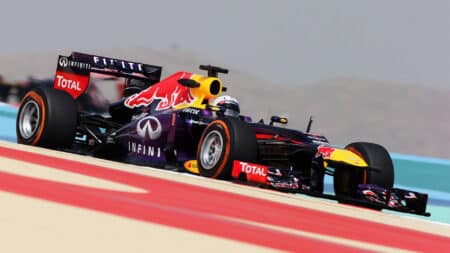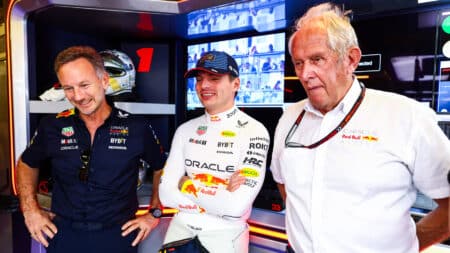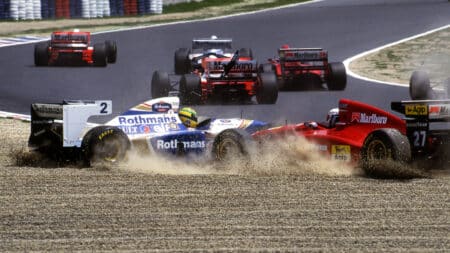
Why isn't 2025 F1 season as close as predicted? The past explains why
McLaren's breakthrough in a near-four-year-old ruleset shows F1 rules convergence is a myth – just like Sebastian Vettel, Red Bull and Renault did in 2013, writes Mark Hughes
In Austin Lewis Hamilton duly clinched his third world championship, and there’s no reason why anyone should be surprised. Whatever the era in grand prix racing, enthusiasts have always argued about who is the greatest driver of the moment, and that will never change. Agreeing on who is the fastest tends to be more straightforward.
They are, after all, not necessarily one and the same. Jody Scheckter, for example, described Gilles Villeneuve as “the fastest racing driver here has ever been,” and offhand I can think of none quicker that I have ever seen, but pure speed is not the whole of it. Jochen Rindt, for example, I always thought the quickest of his time, but to me Jackie Stewart was the greater all-round driver.
Go back to the ‘80s and early ‘90s and most would instantly suggest that Ayrton Senna was the greatest, but Stewart is not among them. “Most people thought Senna was the best, but I never did. Certainly he was quicker than Prost – than any of them – but there’s more to being a great driver than simply being quicker, and I thought Prost a much more complete driver. Every time Ayrton got in a car, he drove it at the limit – but Alain always had something in reserve, and he made far fewer mistakes…”
Most drivers of this and the last era, looking back to when they were kids, would take issue with JYS. Prost may have been the favourite of such as Button and Webber, but Senna was the man who captured the imagination of most, including Alonso and, overwhelmingly, Hamilton.
In becoming world champion for the third time, Lewis has now equalled the record of his hero, and on race wins he is ahead. Since Austin the ‘meejah’ has spoken of little else, suggesting that he has now attained legendary status, just like Ayrton.
Should we be surprised that he has won the title again? No, of course not: when the fastest driver – and of that there’s no doubt – is in the fastest car, to bet against him would be idiotic. In 2015 Hamilton may have been leading an extraordinary life away from the circuits, but anyone who thought the extra travel, and so on, would ultimately take its toll, has – so far, anyway – been proved dead wrong. One way and another, Lewis has shed a lot of baggage in the last year, and at the circuits has been more relaxed than ever before.

You can argue that Mercedes has – again – enjoyed such a degree of superiority that, while Vettel and Ferrari have occasionally threatened, usually Hamilton has had only his team-mate to worry about. And you can argue, too, that Rosberg, while sometimes capable of beating him fair and square, is no Prost.
After their close fight for the championship in 2014, I suspected that Nico would be even stronger this year, but such has not been the case. Lewis – quite often, as at Monza, utterly free of pressure, away in a race on his own, setting new fastest laps for the hell of it – has driven sublimely.
From the archive: Mark Hughes decodes the enigma of Lewis Hamilton (2014)
If anything about him surprises me – apart from shedding the trademark yellow helmet, worn in homage to Senna – it is that, even with the championship in the bag, he needs still to drive so hard against his team-mate. Perhaps he believes, as did Senna of Prost, that Rosberg will always give way rather than risk an accident – and perhaps he is right. Ever since the Belgian Grand Prix in 2014, Nico, whose front wing made contact with Lewis’s rear wheel, causing him a puncture, has been in no doubt of the consequences of ‘a touch’ with the other Mercedes.
Booed on the podium by morons, more to the point he was squarely berated by his own team. Rosberg is more resilient than many believe, but Spa left a mark on him.
Twice in the last three races Hamilton has run Rosberg off the road, causing him each time to lose places to the opposition, which cannot have much impressed Messrs Wolff and Lauda. In Austin the move was particularly unsubtle, and the two Mercedes touched – fortunately without either incurring a puncture.
You can say – and I won’t argue – that it would never have happened if Nico, on pole, had made a better start, but Lewis’s suggestion that he had simply understeered into him fooled no one: as the cockpit footage revealed, he understeered into the other Mercedes because he didn’t turn the steering-wheel as much as he might have done.
A few years ago I had a long conversation with Hamilton, specifically about his childhood adoration of Senna, and how much he had based his own approach to racing on that of his hero.
“As a kid,” Lewis said, “I was drawn to Senna because, for one thing, his driving style seemed to be different from anyone else’s. And he seemed to be a daredevil – he always went out of his way to make sure he was at the front. Compared with all the others, he appeared never to be afraid – he seemed to have that little bit of an edge.
“I’ve always felt like I had a connection with him, that we’re somehow similar – I do crazy things that other people wouldn’t do, and I feel like I have an edge, too, that I share something with him. He was such a warrior – that was what I loved about him.”
At one point I suggested that Senna, for all his fantastic ability, on many occasions did pull stunts on the track that went beyond accepted – and acceptable – limits, and Lewis tried to make light of it: “Oh… I think that was probably Senna’s Brazilian spirit, Brazilian nature coming out…

“You do get people who do that, you know – try to intimidate other drivers. I could do it, too, but I just don’t see the sense in it. When people try and intimidate me, I laugh! The way I look at it, if they’re doing that, it means they’re worried – they feel they have to do something to try and knock my confidence. Personally I think that’s a sign of weakness – and if you let it upset you, they’re going to get the upper hand on you. I don’t do that sort of thing, because I don’t feel I have that weakness. On the track I’ve always been polite.”
Given that Hamilton was but nine years old at the time of Senna’s death, it is not surprising that back then he didn’t appreciate just how bitter had been the feud with Prost.
“You could see it, when you watched the races on TV, but I didn’t read the papers much. Later on I did read about it – and I could relate to it, totally understand how it happened: being in a team with someone who’s very competitive, very quick, who’s pushing you… it’s either one or the other, isn’t it?”
The relationship between Hamilton and Rosberg is a complicated one, in the sense that 15 years ago – in the karting days – they were team-mates, and also friends. As, for example, Scheckter and Villeneuve showed, it is possible for F1 team-mates to remain good pals, but it is unusual. As the late Phil Hill said of his fight with Ferrari team-mate Wolfgang von Trips for the 1961 World Championship: “I liked Trips well enough, but it’s not a normal situation is it? You spend all day trying to beat this guy – and then in the evening you’re supposed to forget all that…”
These scenarios are of course always more acute when one car is dominant, so that the world championship distils to a two-man fight between team-mates. It was just so at McLaren in 1988 and ’89, and often there were moments when Prost gave way: “It was either that, or two McLarens out on the spot – and how stupid would that have been?”
Hamilton is much from the Senna school. “When I got to Formula 1,” he said to me, “I wanted to assert myself in certain ways, one of which was to show that I don’t care who you are, I’ll go up the inside of you. It was important to get across that in a situation where most people would back out of it, I won’t…”
Fair enough – and you’d have to say that most of the time that approach served Senna well. Eventually, though, Prost decided he had had enough. “Before the race at Suzuka in ’89, I told the team, ‘I’m not leaving the door any more.’”
He was true to his word. When Senna – from a long way back – came flying down the inside on the approach to the chicane, clearly he assumed that, as usual, his rival would ‘give him room’ to avoid a coming-together, but he was in for a surprise: Prost turned in.
Perhaps, given the repercussions of what happened at Spa two years ago, Rosberg will never do that – or maybe one day he will react like Prost. Hamilton should be ready for it: whatever he may believe, not even Senna was right all the time.

McLaren's breakthrough in a near-four-year-old ruleset shows F1 rules convergence is a myth – just like Sebastian Vettel, Red Bull and Renault did in 2013, writes Mark Hughes

Madrid finally has a consortium to build the new Formula 1 circuit that will host the 2026 Spanish GP

Helmut Marko caused a stir after the Bahrain GP with his worries that Max Verstappen could leave Red Bull early. But how real are those fears?

Ayrton Senna’s tragic final races in 1994, marked by controversy over illegal traction control and his relentless pursuit of excellence in a challenging car, remain a poignant chapter in F1 history, as Matt Bishop recalls